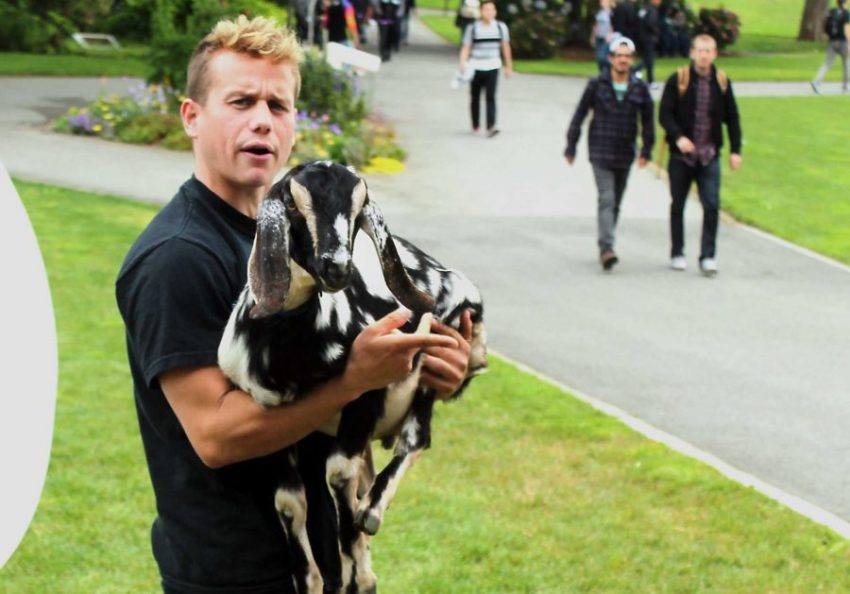Fraternity brothers and sorority sisters did their best to attract new members during this fall semester’s rush week. They sported their house names, played loud music, and engaged with those that walked by. But one fraternity in particular stole the show with their 4-legged mascot named Dartanian.
Dartanian is a 6-month-old Nubian goat that attended this semester’s rush week alongside his owner Parker Sha, member of the Pi Kappa Phi fraternity.
“This is the first time we’ve had an animal out there, but it worked out pretty well,” said PKP member Ben Berke. “So we’re probably going to bring him back.”

(center) shows off a goat to students in the Quad at SF State on Thursday, Sept. 1, 2016.
When Dartanian is not pledging alongside his Pi Kappa Phi brothers, he is taking part in his owner’s goat-grazing business.
Parker Sha, an english major at SF State, started his goat business 4 months ago when he received a carpentry job that involved clearing a yard of poison oak. Wanting to clear the yard in an eco friendly manner, he decided to purchase three goats, Dartanian, Raider and Gimli, in order to clear the yard without harming the soil and using poisonous chemicals.
“I always try to do these sustainable initiatives, to take a stand on something,” said Sha. “I needed to get a job done, and figured out a way to do it and figured I would just take care of the goats on the side to be able to get that job done.”
Though some would rather take the easier route and purchase roundup to kill off their poison oak, Sha refuses to do so in hopes of saving the soil.
“I’m not going to get into that cycle,” said Sha. “The goats would get poisoned, or the kids that are eating off the land would get poisoned. So I wasn’t going to go into that cycle, it’s not profitable and it’s not eco friendly.”

Sha’s goat-grazing business continues to gain clientele through word of mouth by friends.
“I know a lot of people that are in construction,” said Sha. “And it’s fun, people love it, people love the goats so far.”
Dartanian, along with Raider and Gimli, live in a 6 by 8-foot goat house Sha built for them on the property next door to his home. Sha plans to continue his eco friendly goat business on a small scale and keep it geared toward residential properties. He currently charges $200-$1000 per project, depending on the size of the property.
Sha’s goat business is not limited to clearing out residential yards. Gimli, his 3-year-old Nigerian Dwarf goat, is the only one out of the three that is not neutered and is used for breeding. Sha earns $200 for each goat Gimli inseminates.
Though some might find running a goat business as a college student unconventional, Meera C. Heller, an assistant professor of Clinical Livestock Medicine at UC Davis said owning goats is increasingly common.
“There has been an increase in pet goats as more people move to the country,” said Heller. “People have small properties or ‘ranchettes,’ also media has made them more popular… They are probably the most popular livestock pet.”
With their increasing popularity as pets, Sha believes goats, along with other eco friendly methods, should replace the common poisonous chemicals for the environment’s sake.
“In 2016 those ideas and that way of life they don’t work anymore. They’re not sustainable,” said Sha. “I’ve thought about it — every aspect is not leaving a footprint and just doing things sustainable and eco friendly, that’s pretty much what I stand for.”
“Yeah, it’s the hard way,” he said. “but it’s my way.”








European Beret • Sep 15, 2016 at 1:44 pm
I’ve always gone to City Grazing on Cargo Way when I needed goats (which was once) or goat manure for fertilizer.
http://citygrazing.com/index.html